 Politics
Politics
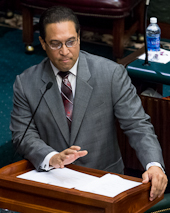
LA opens for budget session
 (CNS): The country’s parliament will open at 10am Monday morning for the government to present its full 2013/14 budget. Despite being more than three months into this financial year, the change of government following the general election led to the need for an interim emergency budget, based on the previous year’s, to enable the new PPM government to collect and spend public money until it shaped its own spending plan. The government has promised that there are no new revenue raising measures, with the exception of the already earmarked directors’ fees, which were set for the last budget but were never introduced.
(CNS): The country’s parliament will open at 10am Monday morning for the government to present its full 2013/14 budget. Despite being more than three months into this financial year, the change of government following the general election led to the need for an interim emergency budget, based on the previous year’s, to enable the new PPM government to collect and spend public money until it shaped its own spending plan. The government has promised that there are no new revenue raising measures, with the exception of the already earmarked directors’ fees, which were set for the last budget but were never introduced.
The budget, which received the nod from the UK last week, is expected to reveal a significant reduction in spending.
The session will begin, as is traditional, with the governor’s throne speech, which will be presented on the floor of the Legislative Assembly. This will be Helen Kilpatrick’s first major public presentation following her short acceptance speech when she arrived last month. As a fiscal expert herself, Kilpatrick is expected to play a significant part in managing public finances. Premier Alden McLaughlin is expected to deliver a presentation outlining the thinking behind the budget, followed by the delivery of the details by Marco Archer, the finance minister.
Speaking at the recent Chamber of Commerce Legislative Lunch last month, the premier said that the PPM’s four-year fiscal plan had received the approval of the UK on first submission and this will be the first budget under the revised long term plan. Without what McLaughlin called “a lot of fiscal space in which to operate”, he said the budget was “a test of fiscal discipline characterized by new levels of efficiency and imaginative solutions” to achieving the necessary budget goals.
Over the years the Cayman government’s spending has reached almost three quarters of a billion dollars, pushing revenue generation to the maximum. But with a new era of fiscal discipline in the civil service, which McLaughlin said had been embraced by public sector management, and with the assistance of Richard Holmwood, the FCO’s economic advisor, the budget would see even further reductions in spending and in particular personnel costs.
With no new borrowing and plans to continue paying down the existing debt and make a substantial contribution to government’s past service pension liability, any “investments in capital projects will be responsible and revenue measures will be zero inflationary,” he said, adding that the budget projects a substantial surplus.
Including statutory authorities, the government holds more than $700 million of debt, which still breaks the country’s own fiscal standards set out in the Public Management and Finance Law, which states that government’s loan package cannot be more than 80% of its annual core government revenue earnings. As a result, the UK government is keeping a close supervisory eye on Cayman’s public finances. It has banned all borrowing and is looking for realistic achievable budget plans.
The ban on borrowing imposed by the UK will remain in place until government has reduced its debt and builds up its cash reserves, despite the private sector’s demands on government for more infrastructure development, such as the airport redevelopment and the cruise berthing facilities.
The battle to pull this budget together has not been easy and McLaughlin has spoken about the need for government to think about designing budgets for a full 4-year government term, as the process dominates the legislative calendar. As soon as one annual spending plan is presented to the LA and passed, the cycle starts all over with the delivery of the government’s Strategic Policy Statement in December, which should guide the delivery of a budget in the following April. This needs to be approved and steered through the LA and Finance Committee before the end of June.

Cabinet approves voluntary redundancy policy
 (CNS): Civil Servants with open ended employment agreements who want to leave their public sector job will be given a financial pay-off based on their length of service if they are successful in their application for redundancy. The Voluntary Separation Policy (VSP) developed by the deputy governor and his chief officers has now received Cabinet approval. Core government employees and their bosses will, however have to make a business case for the exit of any civil servant to make sure the loss of the post is sustainable and that the department or service won’t be undermined. With the sustainability of further job cuts in the CS in question, management will need to justify the loss of any public authority worker.
(CNS): Civil Servants with open ended employment agreements who want to leave their public sector job will be given a financial pay-off based on their length of service if they are successful in their application for redundancy. The Voluntary Separation Policy (VSP) developed by the deputy governor and his chief officers has now received Cabinet approval. Core government employees and their bosses will, however have to make a business case for the exit of any civil servant to make sure the loss of the post is sustainable and that the department or service won’t be undermined. With the sustainability of further job cuts in the CS in question, management will need to justify the loss of any public authority worker.
A business case by the relevant chief officer that shows how an organization expects to achieve improved efficiency through the separation must accompany the applications, Deputy Governor Franz Manderson explained.
“To successfully reduce the size of the civil service in a manner that avoids negative impacts for the public, we feel it is very important to plan this process,” he said in a release Thursday evening. “The approach of doing more with less is not something we can sustain without impacting the quality of service we provide.”
Civil servants have until the end of this month, 31 October, to review the policy, which the Portfolio of the Civil Service published internally today (3 October), although it has not yet been made public. If they are interested in the scheme, they should make an application or ask questions before the deadline. Separation from the service is expected to begin as early as January 2014.
Eligibility is limited to core civil service workers who have open-ended employment agreements with the Cayman Islands Government but not those on contract.
Anyone considering the proposal will have access to advice from the Public Service Pension Board as well as Lewis Consulting Services. A voluntary separation committee, made up of the deputy governor, the financial secretary and the chief officer of PoCS, will assess the impact of the proposed scheme on individuals and their organisations.
Compensation for successful applicants will be based on continuous service. They will also have access to limited CINICO coverage ranging from three to six months.
See policy below
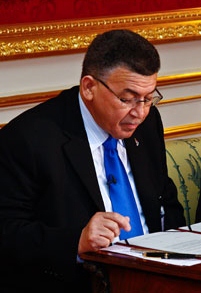
Overseas territories used as pawns, says Bush
 (CNS): The opposition leader and former Cayman Islands premier has accused the British of using its overseas territories as pawns and pointed to the need for the UK to begin debating the issue of self-determination and independence. Speaking at the 59th Commonwealth Parliamentary Association Conference in Johannesburg, South Africa, last month from what he said were his own experiences, McKeeva Bush pointed out that while the UK talks about territories being allowed to determine their own future, the reality is very different. He said the constitutions agreed between Britain and its territories undermine self-determination efforts because they block any effort of the OT governments to be self-sufficient.
(CNS): The opposition leader and former Cayman Islands premier has accused the British of using its overseas territories as pawns and pointed to the need for the UK to begin debating the issue of self-determination and independence. Speaking at the 59th Commonwealth Parliamentary Association Conference in Johannesburg, South Africa, last month from what he said were his own experiences, McKeeva Bush pointed out that while the UK talks about territories being allowed to determine their own future, the reality is very different. He said the constitutions agreed between Britain and its territories undermine self-determination efforts because they block any effort of the OT governments to be self-sufficient.
“The Cayman Islands have no mandate for independence nor has the question arisen publicly. Although the older I get, the more I realize that it ought to be debated,” he told the delegates in South Africa. While the UN points to the rights of self-determination, when the matter arises with the Foreign and Commonwealth Office, he said, OT governments get a “mixed bag of answers”.
“We do get a constitution of sorts from the FCO but it always contains wording that gives the governor much leeway, to say the least, that can stop self-determination efforts and can kill self-sufficiency efforts. Self-sufficiency is, as far as I am concerned, the main ingredient to make it possible to be self-governed.”
The opposition and UDP leader said when efforts are made towards self-sufficiency, such as attracting inward investment, the UK forces territories to follow their way, under the guise of international norms, as he implied that between the UK and Cayman it was the competition that made the administering power impose its will. “None of their actions assist us on the way for self-determination, nor help us to be self-sufficient, and certainly do not lend itself to self-governance,” he said.
Bush had gone head to head with the FCO during his time in office over the process by which he had attempted to kick-start major capital projects. The biggest clash was over his plans to enter into a deal with the Beijing based firm, China Harbour Engineering Company, limited to build the cruise berthing facilities in George Town without following the process for such projects set out in Cayman’s own public finance laws. Despites warnings from the FCO that Bush, who was also tourism minister at the time, should put the port plans back in line with international best procurement practice, he ignored them until Mark Simmonds, the OT minister, issued an order to Bush not to sign a deal with CHEC.
Speaking in South Africa, and clearly reflecting on that incident, Bush said that in his experience in government, more and more pressure was put on the territories to “kow-tow to the views and standards of those with whom we would be negotiating our self-determination,” he said. “What kind of fairness and equality could we expect, where we compete for the same business? How would we be self-sufficient?"
Pointing to a need for wider education on the whole subject of independence, Bush warned that territories are often manipulated.
“At one time or another, all colonial territories are used as pawns,” he added.
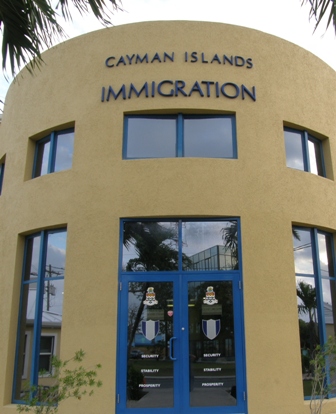
Meetings planned to explain immigration reform
 (CNS): Government will be talking to the people about what have become controversial plans to overhaul immigration by removing the key employee designation and essentially pushing rollover beyond the PR application process. With the potential regularization of more than 1500 foreign workers who would have been rolled over had they not received the Term Limit Exemption Permits, at a time of growing local employment, the new government has encountered some resistance to its plans despite campaigning on a platform of change during the run up to the May General election. With a demonstration planned against the immigration amendment bill for 11 October the government is planning a series of town hall meetings starting in West Bay.
(CNS): Government will be talking to the people about what have become controversial plans to overhaul immigration by removing the key employee designation and essentially pushing rollover beyond the PR application process. With the potential regularization of more than 1500 foreign workers who would have been rolled over had they not received the Term Limit Exemption Permits, at a time of growing local employment, the new government has encountered some resistance to its plans despite campaigning on a platform of change during the run up to the May General election. With a demonstration planned against the immigration amendment bill for 11 October the government is planning a series of town hall meetings starting in West Bay.
According to a release from the premier’s office the meetings will “help constituents and residents understand the proposals being made in Immigration Reforms,” it stated.
The employment initiatives under way to get Caymanians in to work will also be discussed at the public meetings which will start in the District of West Bay at 7pm Tuesday, 8 October at the John A. Cumber School Hall and the public is urged to attend.
Officials said meetings in the remaining Districts will be announced as dates are set.

Locals to get help with jobs
 CNS): Government has announced the formation of a new task force to review the National Workforce Development Agency (NWDA) to ensure that the department fulfils its remit. In the meantime, government officials and the country’s political representatives have committed to helping all unemployed Caymanians take up posts currently occupied by term limit exemption permit (TLEP) holders. As government begins the first step in its major overhaul of the immigration laws and policies, the regularization of TLEPS will not happen until all the positions they hold are advertised and jobless locals are given the chance to apply for those jobs.
CNS): Government has announced the formation of a new task force to review the National Workforce Development Agency (NWDA) to ensure that the department fulfils its remit. In the meantime, government officials and the country’s political representatives have committed to helping all unemployed Caymanians take up posts currently occupied by term limit exemption permit (TLEP) holders. As government begins the first step in its major overhaul of the immigration laws and policies, the regularization of TLEPS will not happen until all the positions they hold are advertised and jobless locals are given the chance to apply for those jobs.
In order for that to happen, out of work Caymanians are being urged to submit their details to the NWDA agency which will be involved in the government wide effort to identify unemployed Caymanians and match their skills with the vacancies.
As part of the first major set of amendments to the immigration law the TLEPS whose special permits expire at the end of October will be regularized or rolled over. Employers are being given 45 days to apply for normal work permits for these ex-pat employees but every one of the more than 1500 jobs must be advertised first.
According to a release from the premier’s office Thursday, the National Workforce Development Agency will be provided with a list of all the jobs that are currently held by TLEPs which will be used to assist Caymanians who have the necessary qualifications or experience to apply for those jobs.
A task force is being created to review the NWDA which has been severely criticised in the past for failing to link people registered as unemployed with jobs held by permit holders. A recruitment drive is also expected shortly to increase the staffing levels so that the agency can do the work it was created to do.
“We recognise that in order to adequately meet the needs of the community the NWDA requires additional staff,” said the chief officer for employment, Mary Rodrigues. “The necessary approvals have been received by Cabinet and we are expecting to receive approval to begin recruiting shortly."
While government says it is working to match unemployed Caymanians with jobs held by those on work permits, a task force has been formed to review the NWDA and identify areas of priority that need to be addressed so that staff can deliver the services and the support necessary to aid in the training, development and employment of Caymanians in the short and long-term.
“The NWDA was established in 2012 to help prepare Caymanians to take part in current and future economic opportunities,” said Bodden Town MLA Alva Suckoo, the councillor in the home affairs ministry who will be leading the review committee. “Government sees a need to step in and help the agency refocus its original remit so that Caymanians can get jobs and employers can confidently hire local employees.
“We must assist Caymanians to become better prepared to make a meaningful contribution to our society and this initiative goes a long way towards offering them the assistance they need in order to become better employees, while removing the obstacles and pitfalls they often find in their way,” he added.
The committee will analyse the priority areas and current NWDA operations and submit a report for each area advising how the agency is delivering its services. The Task Force will take all information and suggest ways to enhance the NWDA’s abilities to carry out its duties.
Suckoo will be joined in chairing the committee by Dr Tasha Ebanks, deputy chief officer in the ministry of education, employment and gender affairs and they in turn will work with o a cross section of human resource professionals, members of the financial services industry, tourism professionals, small business representatives and others. The Task Force will begin meeting next week and is expected to submit its final report in January, 2014.
In the meantime, however, the NWDA will be involved in the push over the next few weeks to try and get locals in the available jobs that the TLEPs transition presents. All TLEPS expire on 28 October and under the proposed immigration reform, no new TLEPs will be issued after that date. Employers will be given until 9 December this year to apply for work permits for these 1,500 foreign workers but they will need to advertise the positions enabling all efforts to be made to identify a Caymanian who is capable and available to fill the position.
All employment applicationsmade to any employer, including those who have workers on TLEPs, should be copied to the NWDA so that agency can track applicants and inform Immigration when there is an available Caymanian. Caymanians who are looking for a job are urged to immediately register with NWDA so they are in the database of available Caymanian employees.
In addition, to the agency and the work of government officials all elected members of government and MLAs have committed to providing assistance and help match their jobless .constituents with the TLEP vacancies.
The employment minister, who has said very little publicly about unemployment or the PPM government’s decision to change the immigration laws, said in the release that she felt, “passionate about the fact that our Caymanian people must be able to access the real job opportunities in this economy.”
The changes to the immigration law are expected to be debated in the Legislative Assembly later this month following the budget debate and the finance committee hearings which begin next week.
The immigration department has released a document listing the positions held by TLEPS but the department is urging Caymanians looking for work to contact the NWDA and not their office to help in the process of matching their skills to the jobs on the list. Immigration officials confirmed that until the employers have advertised the positions and considered all of the qualified Caymanians spouses of a Caymanians, and permanent resident applicants and determined that none of the applicants meet their requirements only then can the employers of TLEP holders submit a work permit grant application for consideration.
Government has also announced a series of town hall public meetings to present the immigration changes which will start in West Bay next Tuesday, 8 October, at 7pm
See list of permit holders and the immigration amendment bill below
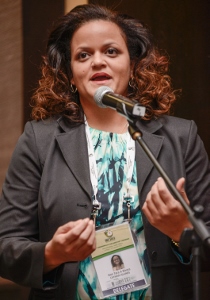
CPA trip to South Africa cost public purse 13K
 (CNS): The recent trip to the annual Commonwealth Parliamentary Association Conference in Johannesburg, South Africa, by Speaker of the House Juliana O’Connor-Connolly, Opposition Leader McKeeva Bush and Education Minister Tara Rivers cost the public purse just over CI$13k, according to records released by the Legislative Assembly. As the regional representative for the Caribbean, Americans and Atlantic and a member of the Executive Committee, O’Connor-Connolly’s flight was paid for by the international CPA. The speaker cost the public purse just $1,650 in total for her expense allowance. However, the public purse paid for the flights for both Bush, who delivered two papers at the conference, and Tara Rivers, who attended but did not present.
(CNS): The recent trip to the annual Commonwealth Parliamentary Association Conference in Johannesburg, South Africa, by Speaker of the House Juliana O’Connor-Connolly, Opposition Leader McKeeva Bush and Education Minister Tara Rivers cost the public purse just over CI$13k, according to records released by the Legislative Assembly. As the regional representative for the Caribbean, Americans and Atlantic and a member of the Executive Committee, O’Connor-Connolly’s flight was paid for by the international CPA. The speaker cost the public purse just $1,650 in total for her expense allowance. However, the public purse paid for the flights for both Bush, who delivered two papers at the conference, and Tara Rivers, who attended but did not present.
Rivers' flight cost $4,232.21 and the flight for the opposition leader was $3,868.75. Both were also given an expense allowance of $1,650. Accommodation for all of the Cayman delegates was also provided for by the CPA.
The trip stirred up considerable controversy for Rivers in particular, as the education and employment minister had been away from her desk for several weeks before the ten day trip as a result of a legal battle challenging her eligibility to run for office. The minister was also criticised for leaving the islands at a time of rising unemployment and numerous challenges relating to scholarships and teaching issues at the start of the school year.
As the regional representative O’Connor- Connolly was expected to attend and the local branch of the CPA had opted to send the opposition leader after he was invited by the international CPA to give two presentation papers, one on ethical tax-raising in small states and a second on self-determination.
The local membership also made the decision to send Winston Connolly as its third delegate, as a new member of the LA. However, at some point after that meeting Connolly was replaced by Rivers.
The public disclosure of the education minister’s decision to go to Johannesburg was not made until the minister was missing from her seat when the Legislative Assembly met to deal with outstanding supplementary appropriation issues. Despite two previous occasions when government could have detailed Rivers' decision to go, it appeared that her trip was kept under wraps.
As a result of the backlash, on her return Rivers issued a lengthy statement in which she accused the media of sensationalizing her trip and of gender discrimination as she attempted to justify her reasons for going. However, the statement was greeted with considerable skepticism, and with almost a 140 comments on the CNS report relating to her statement, only a handful appeared to defend the new minister.
See document released relating to expenses for CPA trip below and check back to CNS tomorrow for details of Bush’s presentations.
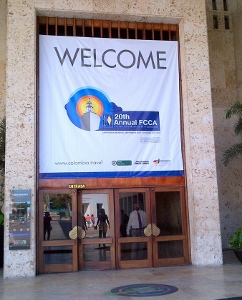
Tourism minister and CS bosses travel to Colombia
 (CNS): Moses Kirkconnell, the deputy premier and tourism minister, along with his chief officer, Stran Bodden, and Department of Tourism Director Shomari Scott, left Cayman on Monday for Cartagena in Colombia for the 20th Annual Florida-Caribbean Cruise Association Cruise and Conference Trade Show. Justifying the trip, government officials said that during the five day visit the minister will meet one-on-one with FCCA President Michele Paige to discuss cruise tourism and the status of cruise ship berthing on Grand Cayman. He will also be talking to partners in the cruise industry about the local product and the Cayman Islands Turtle Farm as an on-shore destination for cruise ship passengers and meeting with regional tourism ministers to discuss the industry.
(CNS): Moses Kirkconnell, the deputy premier and tourism minister, along with his chief officer, Stran Bodden, and Department of Tourism Director Shomari Scott, left Cayman on Monday for Cartagena in Colombia for the 20th Annual Florida-Caribbean Cruise Association Cruise and Conference Trade Show. Justifying the trip, government officials said that during the five day visit the minister will meet one-on-one with FCCA President Michele Paige to discuss cruise tourism and the status of cruise ship berthing on Grand Cayman. He will also be talking to partners in the cruise industry about the local product and the Cayman Islands Turtle Farm as an on-shore destination for cruise ship passengers and meeting with regional tourism ministers to discuss the industry.
“It is important for the Cayman Islands to be represented each year at this conference to let those in the industry know that we are still a viable destination for cruise ships and their passengers,” said Kirkconnell. “We had more than 1.5 million cruise visitors last year and we would like to work with the industry to see that number grow. Based on current forecast, our cruise passenger numbers are showing steady increase for this up and coming season. One way to continue that increase is attending conferences like this one.”
The annual FCCA Cruise Conference & Trade Show is considered a major event by the sector where key industry players can analyse trends and discuss current issues. The forum attracts nearly 1,000 cruise industry partners, including some 100 cruise executives each year. The conference also offers a number of round-table discussions led by a roster of industry experts and guest speakers who are specialists in marketing, sourcing, shore excursions and operations.
As Cayman waits on its business case for cruise berthing in the George Town Harbour, which is being undertaken by PricewaterhouseCoopers and expected to be completed this month, the tourism minister has said he is working on increasing calls to Cayman, ahead of the start of the very long awaited berthing facilities.
Officials said that the three Cayman delegates will return to Cayman on 5 October and in the interim Joey Hew, the PPM’s backbench councillor in the ministry, will be acting Minister of Tourism and Transport in Kirkconnell’s absence.

Other CS experts sought to help NWDA
 (CNS): With unemployment mounting, the National Workforce Development Agency is clearly struggling to cope with its remit to register unemployed locals and match them to jobs, so human resource professionals from across the civil service are being sought to help it out. According to the minutes from the deputy governor’s meeting with civil service heads, on 23 September, chief officers are being asked to identify HR experts that could be seconded to the agency to help audit and update its lists. With the imminent passage of changes to the immigration law and the planned regularization of around 1,500 Term Limit Exemption Permit holders, there could be a surge of people registering with the agency in the next few weeks.
(CNS): With unemployment mounting, the National Workforce Development Agency is clearly struggling to cope with its remit to register unemployed locals and match them to jobs, so human resource professionals from across the civil service are being sought to help it out. According to the minutes from the deputy governor’s meeting with civil service heads, on 23 September, chief officers are being asked to identify HR experts that could be seconded to the agency to help audit and update its lists. With the imminent passage of changes to the immigration law and the planned regularization of around 1,500 Term Limit Exemption Permit holders, there could be a surge of people registering with the agency in the next few weeks.
However, according to the minutes, the current NWDA list of Caymanians seeking employment requires verification and updating.
“HR professionals within CIG are being sought to audit the list. CO’s were asked to identify staff within their agencies that could be seconded for a week to assist with this audit. This cross Ministry collaboration has the full support of the Deputy Governor,” the minutes record.
The NDWA has come in for significant criticism as the agency does not seem able to manage what many Caymanians believe should be the straight forward task of matching unemployed locals with vacancies registered with the agency and, in particular, those where a work permit is being sought.
The current government has promised a major review as the agency, which will be expected to take centre stage in the PPM government’s goal to tackle unemployment and ensure permits are not being given to employers when Caymanians are available.
Among other issues discussed at the 23 September public sector heads’ meeting, it was revealed that number of performance assessments completed in the service was steadily rising ahead of Monday’s deadline for all public sector workers to have been assessed. The minutes also revealed that the CS management discussed the importance of developing a five-year reform plan and agreed that a service-wide consultation process was necessary.
The COs discussed the contentious issue of the occupancy levels at the Government Accommodation Building and the need to improve the rate from its current level of 65% to 85%, which will maintain flexibility and facilitate optimal occupancy. The ministry and portfolio bosses were asked to identify agencies that were currently not located in the GAB, including their staff complement and office requirements.
See released minutes below.

UK OKs PPM’s full budget
 (CNS): The Foreign and Commonwealth Office has approved the new government's first full budget, which will be presented to Legislative Assembly on Monday 7 October, with the debate on the budget starting on the following Thursday 10 October, the premier's office has confirmed. Officials said that London gave its approval to the full 2013/14 budget today, Tuesday 1 October, giving the new administration over four weeks to ensure its passage and scrutiny by Finance Committee before the current emergency approved spending expires at the end of this month. “We have put in many long hours, thought and debate in bringing this budget together," Premier Alden McLaughlin stated in a release following the UK's nod for his government's spending plan.
(CNS): The Foreign and Commonwealth Office has approved the new government's first full budget, which will be presented to Legislative Assembly on Monday 7 October, with the debate on the budget starting on the following Thursday 10 October, the premier's office has confirmed. Officials said that London gave its approval to the full 2013/14 budget today, Tuesday 1 October, giving the new administration over four weeks to ensure its passage and scrutiny by Finance Committee before the current emergency approved spending expires at the end of this month. “We have put in many long hours, thought and debate in bringing this budget together," Premier Alden McLaughlin stated in a release following the UK's nod for his government's spending plan.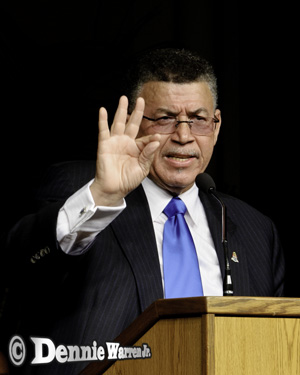
Mac blames division on PPM
 (CNS): The opposition leader has said that the current serious divisions in the community over the proposed immigration amendments and the planned street march against the changes are a direct result of the People’s Progressive Movement’s anti-foreign stance which has back-fired. McKeeva Bush said the PPM’s position for the last ten years had created unrealistic expectations. Although he has not yet stated what line the opposition United Democratic Party will take on the Immigration Amendment bill when it comes to the Legislative Assembly as discussions are ongoing, he said that the UDP took the position that the country must grow while Caymanians must be given the first opportunity on jobs.
(CNS): The opposition leader has said that the current serious divisions in the community over the proposed immigration amendments and the planned street march against the changes are a direct result of the People’s Progressive Movement’s anti-foreign stance which has back-fired. McKeeva Bush said the PPM’s position for the last ten years had created unrealistic expectations. Although he has not yet stated what line the opposition United Democratic Party will take on the Immigration Amendment bill when it comes to the Legislative Assembly as discussions are ongoing, he said that the UDP took the position that the country must grow while Caymanians must be given the first opportunity on jobs.
Responding to the controversies surrounding government’s proposed changes to immigration, Bush said that the PPM had opposed the UDP’s immigration philosophy for ten years and had now got itself into trouble.
“The PPM as a government has found themselves in a ‘pickle’ because of their political campaign based on lies, Anansi stories and an anti-foreign mentality, which did nothing but grow false expectations, which now they're finding out can't be sustained if our country is going to be a viable location for both local and international business whilst also being able to keep giving our people free education, healthcare, better roads etc," the opposition leader told CNS.
“The PPM opposition was a damning opposition to the UDP's immigration philosophy since 2003. They ran a successful national campaign based on scare mongering, anti-foreign residence and employment against the UDP immigration policies from 2003 to recently, wherein they tricked businesses to support them in their negativity towards most things foreign,” he said.
Bush claimed this had resulted in the current division and that the planned public march would generate particularly bad press for Cayman and fuel the negativity.
“The problem of migration and immigration has been the 'harlot of the ages', but in a small country such as ours with no vast natural resources, it is showing just how negative political posturing to win the government at any cost, as the PPM did, will indeed inflict wounds that will go deep if there is not a change in their narrow-minded approach,” Bush warned.
“My position is: first the country must grow and our policies must enable that growth to take place. Do we want to go forward or backward?” he asked rhetorically. “Backwards means worse times than what people are experiencing now.”
Secondly, he said, Caymanians must be given the first opportunity on jobs and in ownership of businesses that they can grow, as well as being trained for available jobs and to meet the demands of an ever changing workplace. But he did appear to offer his support for the government’s position that employers have to be truthful about their vacancies.
“This approach includes removing the proverbial glass ceiling and the placement of all truthful, authentic ,advertisements must be part and parcel of any strategy going forward,” he said. Additionally, that must entail a government machinery that is much more forward thinking and a business private sector that is truly a partner … willing to cooperate, with government and all employees towards building a society that is truly beneficial to all stakeholders.
“It is my party's overall position that the future of growth of our country and its society must be based on a relationship which is built on a high and deep level of mutual respect towards growth and the challenges which that growth objective will place before us. Giving Caymanians jobs, jobs, jobs,” Bush stated.
The first phase of changes to the immigration bill are expected to be pushed through the Legislative Assembly before 28 October to avoid the exodus of more than 1,500 people holding what are known as Term Limit Exemption Permits all on the same day. Having made a decision to push the rollover or term limit policy back two years, the new government will be providing every work permit holder, including those with temporary extensions, to now apply for permanent residency, regardless of their working status. The PPM government has rejected the idea that this will open the flood gates for every ex-pat worker to stay, as the premier said that the new permanent residency application process will be more stringent and robust.
Despite the claims, the government has failed to win the hearts and minds of all Caymanians on this issue, and with the independent members for East End and North Side leading a vociferous campaign against the changes and groups of local activists also vehemently opposed, a rally is now planned to march against the policy changes on 11 October.